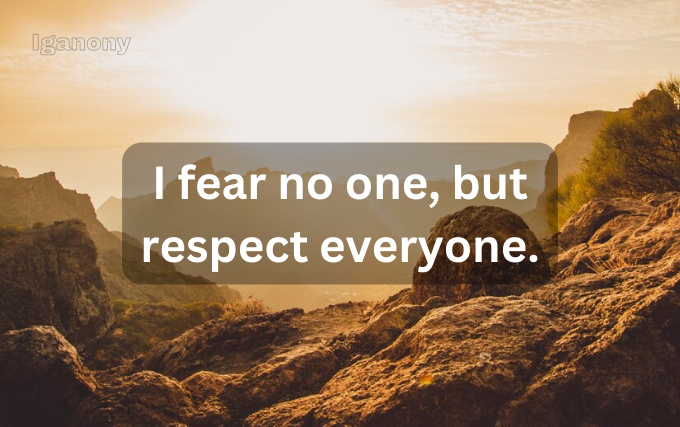Introduction
I Fear No One, But Respect Everyone – Tymoff In a world where power dynamics and social hierarchies often dictate behavior, the principle of fearing no one but respecting everyone stands out as a guiding philosophy for personal and professional conduct. This approach, advocated by Tymoff, emphasizes inner strength and mutual respect, fostering healthier relationships and environments. This article delves into the meaning and implications of this principle, exploring how it can be applied in various aspects of life.I Fear No One, But Respect Everyone – Tymoff
Defining the Principle
What Does It Mean to Fear No One?
Fearing no one involves cultivating confidence and self-assurance, allowing individuals to navigate life without being intimidated by others. It’s not about arrogance but about recognizing one’s worth and capabilities.I Fear No One, But Respect Everyone – Tymoff
The Essence of Respect for Everyone
Respecting everyone means acknowledging the intrinsic value of all individuals, regardless of their status or differences. It’s about treating others with dignity and consideration.
Tymoff’s Perspective
Tymoff, a thought leader in personal development, champions this dual principle as a cornerstone of effective leadership and interpersonal interactions.I Fear No One, But Respect Everyone – Tymoff
The Importance of the Principle
Building Strong Relationships
Respect fosters trust and understanding, essential components of any healthy relationship, whether personal or professional.I Fear No One, But Respect Everyone – Tymoff
Promoting Personal Growth
Fearlessness encourages individuals to take risks and embrace challenges, leading to growth and self-improvement.I Fear No One, But Respect Everyone – Tymoff
Enhancing Professional Environments
In workplaces, this principle can lead to more collaborative and innovative environments, as employees feel valued and unafraid to voice their ideas.
Historical Context
Philosophical Roots
The idea of fearing no one but respecting everyone can be traced back to various philosophical traditions, including Stoicism and Eastern philosophies, which emphasize inner strength and universal respect.
Historical Figures
Many influential leaders, such as Mahatma Gandhi and Nelson Mandela, embodied this principle, using their inner strength and respect for others to drive social change.I Fear No One, But Respect Everyone – Tymoff
Applications in Daily Life
Personal Interactions
Applying this principle in everyday interactions can lead to more meaningful and respectful relationships.
Professional Settings
In the workplace, this approach can improve team dynamics and leadership effectiveness.
Conflict Resolution
Respect and fearlessness can be powerful tools in resolving conflicts, promoting understanding and compromise.
Benefits
Improved Mental Health
Living without fear reduces stress and anxiety, contributing to better mental health.
Greater Social Harmony
Respectful interactions lead to more harmonious communities and societies.
Enhanced Leadership
Leaders who embody this principle are often more effective and inspiring, fostering loyalty and motivation among their followers.
Challenges and Solutions
Overcoming Fear
Building confidence requires self-awareness and practice. Techniques such as mindfulness and positive affirmations can help.
Cultivating Respect
Respecting others can be challenging in a competitive world. Practicing empathy and active listening are key strategies.I Fear No One, But Respect Everyone – Tymoff
Personal Stories
Testimonials
Stories from individuals who have embraced this principle highlight its transformative impact on their lives.
Case Studies
Examining how businesses and leaders have successfully implemented this principle can provide valuable insights.
Expert Insights
Psychological Perspective
Psychologists emphasize the importance of self-confidence and respect in achieving personal fulfillment and social harmony.
Leadership Advice
Leadership experts advocate for this principle as a foundation for ethical and effective leadership.
Conclusion
Embracing the principle of fearing no one but respecting everyone can lead to profound personal and societal benefits. By fostering inner strength and mutual respect, individuals can build stronger relationships, achieve personal growth, and contribute to a more harmonious and collaborative world.
FAQs
How can I build my confidence to fear no one?
Engage in self-reflection, set small goals, and practice positive affirmations to gradually build your confidence.
What are some practical ways to show respect to others?
Listen actively, acknowledge others’ viewpoints, and treat everyone with kindness and consideration.
Can this principle be applied in competitive environments?
Yes, by focusing on mutual respect and ethical behavior, even competitive environments can benefit from this principle.


